2009 June
About Andrew Cusack
 Writer, web designer, etc.; born in New York; educated in Argentina, Scotland, and South Africa; now based in London.
Writer, web designer, etc.; born in New York; educated in Argentina, Scotland, and South Africa; now based in London. read more
News
Blogs
Reviews & Periodicals
Arts & Design
World
France
Mitteleuropa
Knickerbockers
Argentina
The Levant
Africa
Cape of Good Hope
Netherlands
Scandinavia
Québec
India
Muscovy
Germany
Academica
Mass for Prince Pedro Luiz
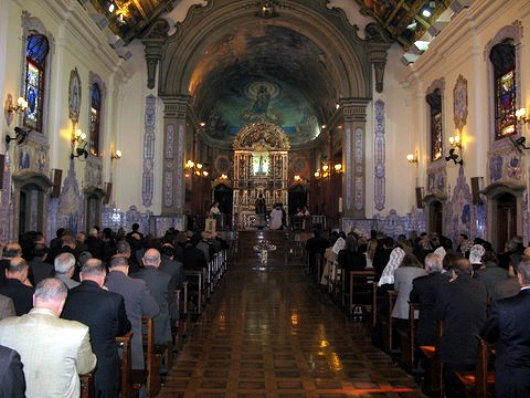
The “week’s mind” Mass, or Mass of seven days, was held a week after the death of Dom Pedro Luiz of Orleans-Braganza in São Paulo, Brazil on June 8, 2009. The Mass was offered according to the extraordinary (or Tridentine) form of the Latin rite. The members of the Imperial Family of Brazil were in attendence. (more…)
On the Death of Prince Pedro Luiz
A STATEMENT FROM D. LUIZ DE ORLEANS E BRAGAÇA
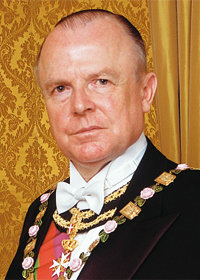 PIERCED WITH SORROW, I fulfill my duty as Head of the Imperial House of Brazil to communicate the disappearance of my beloved nephew and much-regretted D. Pedro Luiz de Orleans e Bragança, in the fateful May 31 ocean crash of the Air France Rio-Paris flight.
PIERCED WITH SORROW, I fulfill my duty as Head of the Imperial House of Brazil to communicate the disappearance of my beloved nephew and much-regretted D. Pedro Luiz de Orleans e Bragança, in the fateful May 31 ocean crash of the Air France Rio-Paris flight.
Given the harrowing pain of his parents, D. Antonio and D. Christine, his brothers, D. Amélia, D. Rafael and D. Maria Gabriela, and my dear Mother, D. Maria, I turn to them with special solicitude and affection. And with the whole Imperial Family, I turn with the same solicitude and affection to all those who have lost their loved ones in the crash. To all these families – so very special to Brazil – the Imperial Family extends its feelings and asks God for the eternal repose of each and every victim.
Over the last few days, D. Pedro Luiz’s parents and I have received so many manifestations of genuine mourning for the tragic event that I can only see these events as a living and authentic expression of the sense of family and ties of affection that unites the Imperial Family and all Brazilians, whether monarchist or not.
D. Pedro Luiz – the fourth in the line of dynastic succession – was a young Prince who rose in his generation as a promise, having attracted the interest and attention of many for his pleasant ways, undeniable qualities and for the traditions he represented.
As a result of his excellent upbringing and fine sense of duty, instilled by his parents, after having graduated in Business Administration at IBMEC in Rio de Janeiro, and his post-graduation at FGV, he took the initial steps of a promising career at BNP Paribas in Luxembourg, and showed great concern and commitment to show foreigners the great potential of our country.
But his presence was especially dear among those who believe the monarchy is the solution for today’s Brazil.
D. Pedro Luiz was honorary president of Monarchist Youth and participated in noteworthy activities and events to the benefit of the monarchic ideal, often in the company of his parents. He represented the Imperial House on occasion, and I am especially pleased to recall his presence in Portugal for the celebration of the 500th anniversary of the discovery of Brazil.
While this is a moment of apprehension and sadness, it can not be devoid of hope. Our hopes turn particularly to D. Pedro Luiz’s brother, D. Rafael – to whom I wish courage and determination in the face of misfortune, and whom I urge to be a true example of a Prince to his generation, turned to the good of Brazil and to setting an example of Christian virtues.
To close this painful communiqué, I turn my eyes to Our Lady Aparecida, Queen and Patroness of Brazil, Whom we beseech with confidence to receive D. Pedro Luiz in eternity. And I ask for special prayers for him, as well as for his parents, brothers and my dear mother, from all those who, in a spirit of faith, have supported the Imperial Family at this time of mourning.
São Paulo , June 5, 2009
Dom Luiz de Orleans e Bragança
Head of the Imperial House of Brazil

Universitas Catholica Ucrainorum, Leopolis
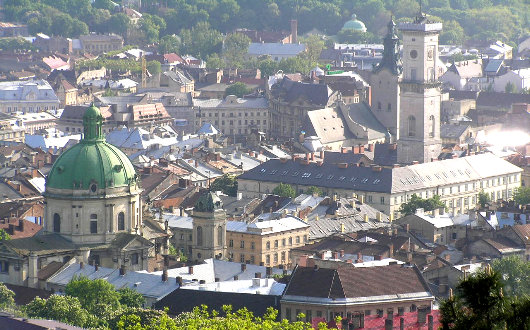
Lviv — sometimes called Lemberg, Lwów, or Leopolis — sits in one of those corners of Europe that has born tremendous witness to the unfolding of history over the centuries. It was founded in the fourth century, built by the Poles, besieged by the Turks, ceded to the Austrians, regained by the Poles, captured by the Nazis, subjugated by the Soviets, and finally freed under an independent Ukraine. Lviv is the capital of Carpathia… and Galicia… not to mention Ruthenia, and nobody can quite define the difference between those three places, while some even argue that one or another (or all) don’t actually exist. For now, we can say with authority that Lviv is the most prominent city in the western Ukraine, and has for centuries been an important place of Catholic culture.
As Damian Thompson points out, Lviv is now home to the Ukrainian Catholic University (Український Католицький Університет). “You must look into this place,” Edward Lucas of the Economist told Damian Thompson: “It’s quite amazing.” (more…)
Cropsey in the City
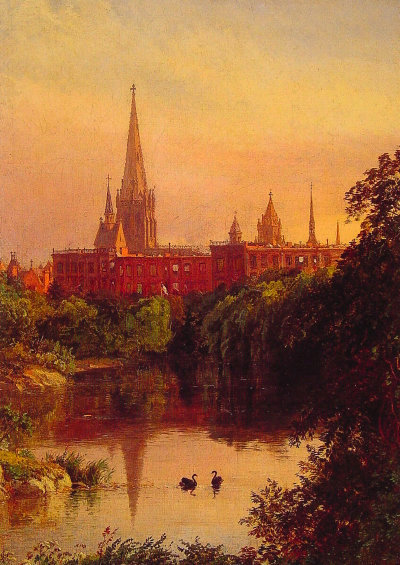
Jasper Francis Cropsey, A View in Central Park — The Spire of Dr. Hall’s Church in the Distance
Oil on canvas, 17⅛ in. x 12⅛ in.
1880, Private collection
THE HUDSON RIVER SCHOOL artist Jasper Francis Cropsey has obtained of late an almost cult-like following, the kool-aid being distributed from the well-oiled machinery of the Newington-Cropsey Foundation in Hastings-on-Hudson, New York. Whether the object of worship is worthy of the faithful’s adulation is a matter of some speculation, but it’s admittedly refreshing to see a fan base surrounding a painter of the old school rather than one of the numerous gimmicky hacks floating around the New York art scene these days. Cropsey (like most Hudson River painters) is known for his luscious landscapes, so I thought it markedly unusual when I stumbled upon this painting, a cityscape. The artist’s vantage point is from The Pond in Central Park, looking over Fifty-ninth Street (Central Park South) towards where the old Plaza Hotel now stands. (more…)
JUST A BRIEF note to say that we’ve slightly redesigned our category & tag archives. They now have a different header than on the home page or individual post pages, which looks a bit snappier. Readers can use our category and tag archives to browse andrewcusack.com by subject, rather than chronologically through the archives page. The tags tend to date only from April 2008 onwards, when this site changed its “content management system”, as it’s called in computerese. (more…)
Engineering Democracy in Poland
This is the text of a talk given by Professor Jerzy Przystawa of the University of Wrocław in Poland. Prof. Przystawa is a physicist who specialises in quantum theory, and has been an active civic intellectual as well. He has also participated in the TriaLogos Festival run by the Foundation Hereditas in Tallinn, Estonia.
by JERZY PRZYSTAWA — 22 JULY 2000
“Sensible” democracy and “sensible” sovereignty
By the end of 1918, after generations of fighting and struggling for a free and independent Poland, the Polish people had created their first truly free and independent state for 123 years. However, the independent Polish State merely survived two decades. 71 years later, the first non-communist Prime Minister in the so-called Eastern Europe, Tadeusz Mazowiecki, proclaimed, in the famous shipyards of Gdańsk, that “Poland lives! Free and Independent!”. The majority of the Polish people readily welcomed the newly acquired freedom.
Since that time many factors began to cloud this rosy picture and many people in Poland now have doubts if the contemporary world is indeed interested in a “free and independent Poland” and that the powers of the West, who are somehow considered to be the godfathers of this new Polish State, indeed intend to create something like a sovereign, self-governing Poland. About a month ago, an important American politician, former security adviser and Secretary of State in the Carter administration, Professor Zbigniew Brzeziński, was receiving his honorary doctorate at the prestigious Jagiellonian University in Krakow. In his solemn address to the learned audience, when he proclaimed “the best decade in the entire Polish history”, he did not dwell upon the question of sovereignty and independence. He rather reappealed to the Poles, a number of times, for “wisdom” and “sensible” or “reasonable democracy”. He did not state exactly what “sensible democracy” he had in mind. But from the general context of his speech there can be little doubt that the “sensible Polish state” should be a state with “limited freedom”, “limited independence”, and “limited sovereignity”. It is then also clear that this “sensible democracy” must also be a “limited democracy”.
How to “engineer” democracy?
There are many ways in which to limit the sovereignty and democracy of the states that emerged after the collapse of the Soviet Union. Perhaps the most important is the exploitation of the enormous economical superiority of the West over the impoverished Eastern societies and the ideas of the so called “free” and “open” international markets. However, it is not my intention to discuss how these countries, unable, under the circumstances, to efficiently compete with the West, are becoming, by economical measures, subordinated and subjugated to foreign rule. I shall also not speak about the rules imposed on our countries by the demands of the European Union. It is the liberty of a free country to make treaties and impose any limitations on its functioning to which free people may consent. My talk will be devoted to the political mechanism that may prevent free people from expressing their will in a democratic way and to have their interests properly represented and protected. A major instrument to achieve such a goal are the electoral rules that have been imposed on Poland, and, as a matter of fact, on other post-communist countries as well. This is the so-called Proportional Representation (PR).
Naturally, there are many people, who will maintain that there are various electoral systems in use all over the world and that it is, to a large extent, a matter of taste, which system is chosen for a given country, since none of them is perfect. But let us have a look at what happened after the World War II, when the victorious allies started to engineer democracy in the defeated countries. (more…)
S.R.E. & S.R.I.
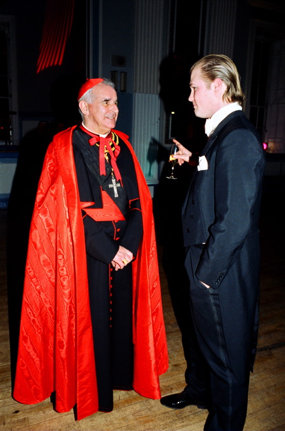
Left, a prince of the Holy Roman Church and right, a prince of the Holy Roman Empire.
Credit: I think this is one of Zygmunt’s photos.
St. Juan Macias, ora pro nobis
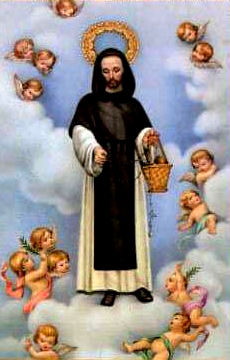
I would ask that all readers of this blog pray for a good friend of mine in Scotland who is now very, very ill.
RIP: Dom Pedro Luís of Brazil

Dom PEDRO LUÍS MARIA JOSÉ MIGUEL
RAFAEL GABRIEL GONZAGA
de
ORLÉANS-BRAGANÇA
e
LIGNE
Prince of the Imperial House of Brazil
Son of H.I.H. Prince Antônio of Orléans-Braganza
&
H.H. Princess Christine of Ligne
Born 12 January 1983 in Rio de Janeiro.
Died 1 June 2009, on Air France Flight 447.
Until his early death, heir-presumptive to the Imperial throne of Brazil.
Requiem aeternam dona ei, Domine:
et lux perpetua luceat ei.
Requiescat in pace.
Amen.
A Classical Summer in New York
ICA&CA 2009 Fellows’ Summer Lecture Series
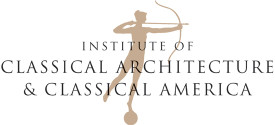 One of our greatest institutions here in New York is the Institute of Classical Architecture & Classical America which does such splendid work in propagating knowledge about and training in classical architecture and its allied arts. Every summer the ICA&CA presents a series of summer lectures, the first of which takes place next Wednesday. This year the series will be held in the library of the General Society (f. 1785), New York’s last remaining guild, whose 44th Street headquarters house the Institute’s offices.
One of our greatest institutions here in New York is the Institute of Classical Architecture & Classical America which does such splendid work in propagating knowledge about and training in classical architecture and its allied arts. Every summer the ICA&CA presents a series of summer lectures, the first of which takes place next Wednesday. This year the series will be held in the library of the General Society (f. 1785), New York’s last remaining guild, whose 44th Street headquarters house the Institute’s offices.
In celebration of the quadricentennial of Captain Henry Hudson’s
sailing expedition on the river that now bears his name.
The Sanctified Landscape: Memory, Place, and the Mid-Hudson Valley in the Nineteenth Century
by Dr. David Schuyler, Professor of American Studies, Franklin & Marshall College. Sponsored by Hammersmith Studios.
17 June 2009
A Geography of the Ideal: The Hudson River and the Hudson River School
by Linda Ferber PhD, Executive Vice President & Museum Director of the New-York Historical Society. Sponsored by P.E. Guerin, Inc.
24 June 2009
Historic Hudson River Houses 1663-1915
by Gregory Long, President and CEO of The New York Botanical Garden. Sponsored by Peter Cosola, Inc.
8 July 2009
Edgewater: Building Classical Architecture along the Hudson River
by Michael Middleton Dwyer, architect and editor (Great Houses of the Hudson River, Bullfinch Press, 2001). Sponsored by Andrew V. Giambertone and Associates, Architects, PC.
General Society Library
No. 20, West 44th Street
Receptions at 6:30 pm
Lectures to follow at 7:00 pm
The ICA&CA Summer Lecture Series is free to ICA&CA Members and employees of Professional Member Firms, as well as all students with current identification. General Admission is $20 per lecture; $65 for the full series. Click here to become a member.
This program is supported, in part, by public funds from the New York Council for the Humanities and the New York City Department of Cultural Affairs. Special thanks to Balmer Architectural Mouldings.
Enda & Declan

“Now you wouldn’t go scuppering this Lisbon deal we’ve got now wouldja, Mr. Ganley?” Mr. Enda Kenny of Fine Gael (left) meets Mr. Declan Ganley of Libertas (right).
While I am accused of being Fine Gael by tribe & temperament, there’s no doubting that party’s been heading in the wrong direction for several decades now. Once moderate in the face of supposed republican extremism, it is now a banal shell of its former self. (Who would Gen. Mulcahy vote for today, one wonders). Those who have the opportunity of voting in the current European elections will doubtless consider voting for Mr. Ganley’s Libertas party, which is running candidates in quite a number of EU member states, including the United Kingdom.
St. Stephen and the Virgin & Child
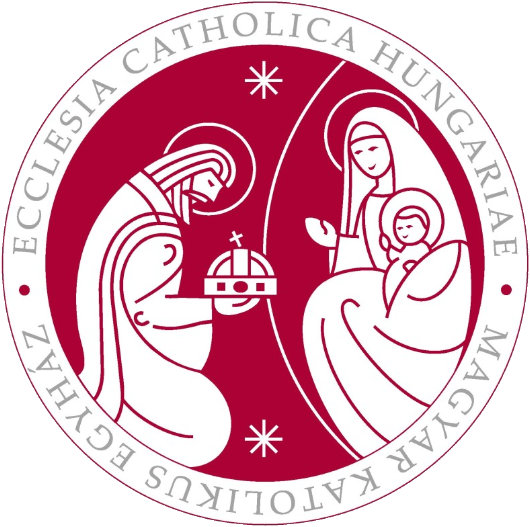
The Hungarian Bishops’ Conference has a surprisingly handsome logo (above) depicting their patronal saint, King Stephen I, bestowing his crown to the Blessed Virgin and Our Saviour. Some might think the depiction of the Madonna & Child a touch too cartoonish, but I enjoy it.
From my inbox
For the record, given that white males launched Roe & have sustained it ever since, the above is a hope all serious Catholics cannot but share.
Pax tibi – [Redacted]
Search
Instagram: @andcusack
Click here for my Instagram photos.Most Recent Posts
- Silver Jubilee November 21, 2024
- Articles of Note: 11 November 2024 November 11, 2024
- Why do you read? November 5, 2024
- India November 4, 2024
- The Lithe Efficiency of the Old Constitution November 4, 2024
Most Recent Comments
Book Wishlist
Monthly Archives
Categories



